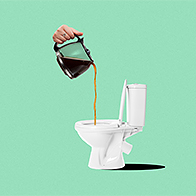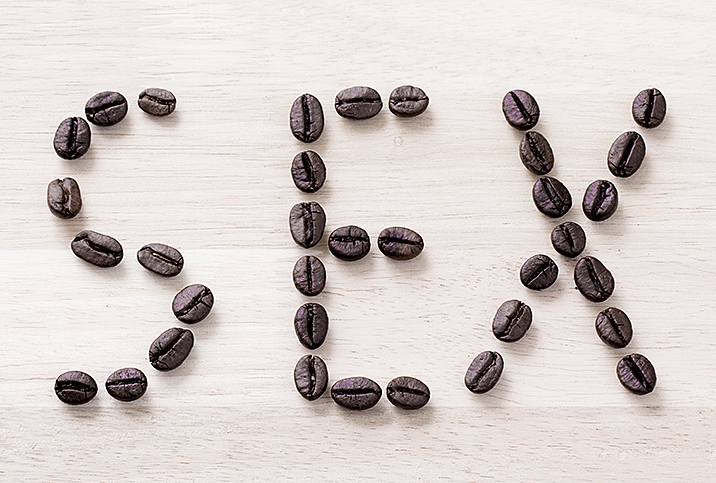5 Energy-Boosting Coffee Alternatives

Throughout most of my teens and 20s, I thwarted the FDA's excessive caffeine warning with gusto, routinely gulping down multiple cups of coffee, along with an energy drink or two. I was convinced it was the only way to power through the day as I worked multiple jobs while going to school full-time, all while grappling with chronic pain, eating disorders and clinical depression.
I now realize that regularly chugging caffeine like water likely did more harm than good.
According to a 2020 report by the National Coffee Association, the average American drinks a little more than three cups per day. That's well within the range of the FDA's recommended maximum of 400 mg of caffeine per day (or about four or five 8 oz. cups), but far less than my reckless intake.
Coffee, in moderation, does have some substantial benefits. It's loaded with antioxidants and can improve mood and assuage depression. It may decrease the risk of Alzheimer's and heart disease.
Why you might want to kick the coffee habit
"Is coffee good for you or not—the age-old question! It seems like one day it's good, one day it's bad…right? Well, it's personal. And it depends on your genetics," said Ellie Busby, M.Sc., MBANT. "Whether you should consume caffeine depends on two things: How well you break down caffeine [and] how sensitive you are to the effects of caffeine."
Caffeine affects people in different ways, she explained. While it may prove wholly beneficial for some, others find it adversely affects their heart, mental health, sleep or other factors.
Busby provided some examples, such as the fact that caffeine increases the risk of a heart attack in people with a version of the CYP1A2 gene, making them "slow" caffeine metabolizers—however, it doesn't affect people who metabolize caffeine quickly. Slow metabolizers may find caffeine hinders athletic performance, while it's a boon for people who metabolize it quickly. Busby also mentioned some postmenopausal women have a genetic predisposition to osteoporosis, which high caffeine intake may exacerbate.
Caffeine affects people in different ways. While it may prove wholly beneficial for some, others find it adversely affects their heart, mental health, sleep or other factors.
Another caveat to caffeine's energy-inducing ability is that it works by stimulating adrenaline, a hormone associated with your "fight or flight" response. If you're prone to stress or have an anxiety disorder, you may well be in fight-or-flight mode some of the time already. Too much caffeine could pitch you from functional to frantic.
"Some people have a genetic variation, which means they don't break down stress hormones efficiently, leading to a buildup of dopamine and adrenaline when they are stressed," Busby said. "Caffeine can spike dopamine and adrenaline levels too, which can increase the risk of anxiety while stressed."
Increased adrenaline is generally bad news for people who suffer from high blood pressure, although recent research suggests those prone to hypertension may consume a moderate amount of caffeine safely.
Coffee's impact on sleep has been extensively researched, too. Caffeine's half-life is up to five hours, so relegating your habit to mornings could help on this front. (For added perspective, caffeine's quarter-life is 12 hours, meaning if you have 100 mg at noon, you still have an active 25 mg at midnight.) However, many people report sleeping better after kicking coffee to the curb completely. Busby said this is undoubtedly true for slow metabolizers. Caffeine's interference with melatonin secretion may factor in as well.
By increasing gut motility, or muscle contractions in the gastrointestinal tract, coffee may exacerbate symptoms for people with gastrointestinal issues, including irritable bowel syndrome (IBS). It can also cause heartburn and gas. For those with urinary incontinence, caffeine's mild diuretic properties may be problematic, too.
Even if coffee doesn't agree with you, it isn't easy to quit. The best way to kick the habit is to substitute your daily pick-me-up with something that'll do the job without being quite so harmful.
1. Matcha
A powder made from ground tea leaves, Matcha contains about one-fifth of the caffeine in coffee.
"Matcha green tea delivers the caffeine slowly throughout the day, so you don't get the instant caffeine hit, [thus] reducing jitters and caffeine crashes that can often occur after having coffee," said Holly Zoccolan, a nutritional health coach and founder of The Health Zoc.
Matcha also contains L-theanine, an amino acid that can positively impact cognition and mood.
"This nutrient helps to regulate two of the most important mood-related chemicals in the brain: serotonin and dopamine," said Trista Best, MPH, R.D., L.D., a registered dietician at Balance One Supplements. "When L-theanine is low, these chemicals—along with cortisol and other stress-related hormones—will become imbalanced, leading to poor mood and increased stress. Drinking matcha is an excellent way to take in more of this important nutrient."
2. Chicory root 'coffee'
Chicory is a plant in the dandelion family whose roots can be roasted, ground and brewed like coffee beans. Its woody, nutty flavor is quite similar to coffee, but it has no caffeine.
"It's a rich source of inulin, which is a soluble fiber that may aid in digestion and support a healthy gut," said Ami Sheward, a registered nutritional therapist, DipION, mBANT, CNHC. "It can also stimulate your gallbladder to produce more bile, which may help with fat digestion."
"Chicory root is available pre-ground and roasted, making [the drink] simple to prepare," Sheward continued. "Simply brew it in a filter coffee maker, cafetière or espresso coffee machine as you would ordinary coffee grounds."
Sheward said it is important to note that, although chicory is generally good for digestion, when it's consumed in excess, it can cause bloating and gas.
3. Golden milk
"Golden milk is new on the energy-boosting and health scene," said Lisa Richards, nutritionist and author of The Candida Diet.
Also known as a turmeric latte, golden milk is a creamy mix of dairy-free milk, turmeric, ginger, cinnamon and a pinch of black pepper. Additionally, it can contain sweeteners, such as maple syrup or honey.
"Turmeric's powerful component curcumin has amazing anti-inflammatory properties, as well as giving your drink a beautiful golden color," Sheward said. "Furthermore, black pepper improves your body's absorption of curcumin."
Richards noted cinnamon and ginger have anti-inflammatory properties as well.
"Turmeric is also known for its antioxidant compounds," Richards added. "This characteristic enables it to fight free radicals and remove toxins from the body. Free radicals can damage the body's cells, leading to various chronic conditions, including fatigue. This is due to the chronic, low-grade inflammation this damage causes. By removing or reducing inflammation in the body, it can operate at a more efficient level, fight off illness and provide us with the rest and energy we require."
4. Guayusa
Guayusa is a tree in the holly genus indigenous to the Amazon rainforests of South America.
"It contains twice as much caffeine as most coffee plants, which makes it a great energy drink alternative to tea, coffee or a soda that's packed with sugar and empty calories," said Jamie Hickey, NASM, FMS, a certified trainer and registered dietician at Truism Fitness.
"It tastes like green tea by itself," Hickey added. "But when mixed with honey and milk (or any other sweetener), it tastes more like iced tea and gives you a boost of energy all day long without making you feel jittery or anxious for hours on end like coffee sometimes does."
Hickey explained guayusa, like matcha, provides slow-release energy, unlike coffee, which produces an intense, immediate effect that can lead to a "crash."
5. Adaptogen herbs
"My favorite way to boost energy levels—especially if I am experiencing low energy due to stress and I've already had a cup of coffee that day—is by taking adaptogen herbs," said Heather Hanks, M.S., CAM, medical advisor at Medical Solutions BCN. "Adaptogen herbs are known as 'stress vaccines.' They work by binding to receptors in the body and regulating cortisol levels, which helps alleviate fatigue and promotes energy."
These herbs—including ginseng, ashwagandha, eleuthero, licorice root, borage and wild yam—have been used in traditional Chinese medicine and Ayurvedic medicine for thousands of years, Hanks explained, to help the body "adapt" to physical and mental stress.
"Research shows that adaptogen herbs also stimulate the central nervous system and have anti-fatigue benefits, increasing our cognitive abilities to reduce mental exhaustion and improve attention during times of stress and fatigue," Hanks said.
These herbs have neuroprotective and cardioprotective properties, and may help regulate blood sugar, fight depression and support gastrointestinal function as well, according to Hanks.
"They really are remarkable herbs, and the best part is that they are caffeine-free," she said.




















